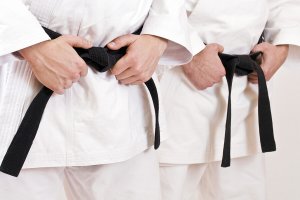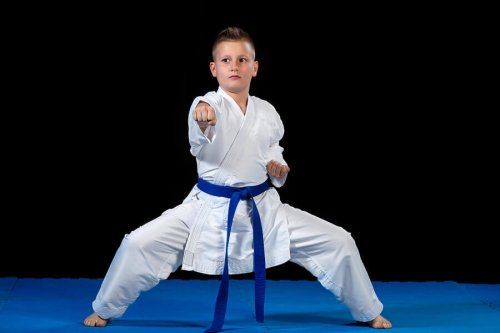Everything You Need to Know About Karate

Karate is one of the oldest and most widely practiced martial arts in the world. In the following article, discover some basic aspects of this discipline, such as the benefits for the body and the elements necessary to practice it. What do you know about karate?
You might like: What are Mixed Martial Arts?
The truth is that very little is known of the exact origins of karate before it appeared in Okinawa, Japan. However, the popular theory states that it came from India more than a thousand years ago, brought to China by a Buddhist monk.
You might like: Perfect Your Body and Mind with Muay Thai
Unlike other types of physical activities, to practice this individual sport you have to be really fit. You can’t just decide to throw a punch or a kick without being in tune enough to take a few hits yourself.
In order for that, you need to prepare yourself with intense and lucrative strength and cardio workouts. This is important in order to develop the necessary resistance to withstand tension and avoid injuries. In addition to being a competitive contact sport, it’s also an effective means of self-defense, since all the skills learned can be utilized in everyday life.
Among other benefits, karate helps athletes develop self-esteem and self-discipline and allows them to stay fit and healthy. As with most martial arts, for many, it becomes much more than a sport. It’s a lifestyle or philosophy that can help you progress and change certain bad habits.
All about karate
As a martial art, karate requires a lot of practice. The entire body can be used to beat the opponent, either with the fists, elbows, hands, feet or knees. The purpose of this fighting technique is to develop a well-balanced mind and body through training.
The objective of karate is to defeat the opponent using punches, kicks, and throws to earn points. At the end of each bout, the competitor with the most points is declared the winner. This can also happen before the end if you reach a total of eight points of advantage over the rival.
About karate: the rules and regulations
Just as with all sports, karate has its rules and everyone who participates in this sport must respect these rules. However, it’s also true that there are many different schools of karate and the rules related to protective equipment and the degree of physical contact allowed differ in some cases.
Karate, similar to other Asian disciplines, emphasizes mental attitude. In fact, concentration is essential in this sport, as it helps to use energy appropriately and execute movements effectively.
It’s also a very good martial art for gaining flexibility and increasing range of motion, as well as improving balance as highly functional movements are used. Surely after some karate classes, you’ll be able to use your body in a much more efficient way!
About karate: equipment needed to practice
1. Uniform
The uniform will include both pants and jacket. Most karate uniforms are lightweight, to maximize the range of motion.
2. Belt
Basically, the belt has the function of holding the jacket closed. However, symbolically, the color of the belt of those who practice karate represents the evolution and level of the athlete. The color order that represents levels is as follows: white, yellow, orange, green, blue, brown and black belt.
3. Helmet and mouthguard
To guarantee safety, the helmet and the mouth guard are two elements always necessary in karate practice. On the one hand, the helmet has the function of reducing the impact of shocks and protecting you against serious injuries.
On the other hand, in addition to protecting the teeth, the mouthguard also prevents the lower teeth from hitting the upper ones and causing injury. Most mouthguards are designed to fit every person and come in adult and youth sizes.
If you’re looking for one of the best contact sports to get into, karate is one that you shouldn’t ignore.
4. Gloves and breastplate
Gloves and bibs come in many different shapes and sizes. Both are essential elements to guarantee the athlete’s safety and minimize the impact of blows.
As you can see, karate is a discipline that allows you to get in shape while having fun, meeting new people and developing life skills. Now that you know more about karate, perhaps the time has come to take advantage of all its benefits. Get started!
Karate is one of the oldest and most widely practiced martial arts in the world. In the following article, discover some basic aspects of this discipline, such as the benefits for the body and the elements necessary to practice it. What do you know about karate?
You might like: What are Mixed Martial Arts?
The truth is that very little is known of the exact origins of karate before it appeared in Okinawa, Japan. However, the popular theory states that it came from India more than a thousand years ago, brought to China by a Buddhist monk.
You might like: Perfect Your Body and Mind with Muay Thai
Unlike other types of physical activities, to practice this individual sport you have to be really fit. You can’t just decide to throw a punch or a kick without being in tune enough to take a few hits yourself.
In order for that, you need to prepare yourself with intense and lucrative strength and cardio workouts. This is important in order to develop the necessary resistance to withstand tension and avoid injuries. In addition to being a competitive contact sport, it’s also an effective means of self-defense, since all the skills learned can be utilized in everyday life.
Among other benefits, karate helps athletes develop self-esteem and self-discipline and allows them to stay fit and healthy. As with most martial arts, for many, it becomes much more than a sport. It’s a lifestyle or philosophy that can help you progress and change certain bad habits.
All about karate
As a martial art, karate requires a lot of practice. The entire body can be used to beat the opponent, either with the fists, elbows, hands, feet or knees. The purpose of this fighting technique is to develop a well-balanced mind and body through training.
The objective of karate is to defeat the opponent using punches, kicks, and throws to earn points. At the end of each bout, the competitor with the most points is declared the winner. This can also happen before the end if you reach a total of eight points of advantage over the rival.
About karate: the rules and regulations
Just as with all sports, karate has its rules and everyone who participates in this sport must respect these rules. However, it’s also true that there are many different schools of karate and the rules related to protective equipment and the degree of physical contact allowed differ in some cases.
Karate, similar to other Asian disciplines, emphasizes mental attitude. In fact, concentration is essential in this sport, as it helps to use energy appropriately and execute movements effectively.
It’s also a very good martial art for gaining flexibility and increasing range of motion, as well as improving balance as highly functional movements are used. Surely after some karate classes, you’ll be able to use your body in a much more efficient way!
About karate: equipment needed to practice
1. Uniform
The uniform will include both pants and jacket. Most karate uniforms are lightweight, to maximize the range of motion.
2. Belt
Basically, the belt has the function of holding the jacket closed. However, symbolically, the color of the belt of those who practice karate represents the evolution and level of the athlete. The color order that represents levels is as follows: white, yellow, orange, green, blue, brown and black belt.
3. Helmet and mouthguard
To guarantee safety, the helmet and the mouth guard are two elements always necessary in karate practice. On the one hand, the helmet has the function of reducing the impact of shocks and protecting you against serious injuries.
On the other hand, in addition to protecting the teeth, the mouthguard also prevents the lower teeth from hitting the upper ones and causing injury. Most mouthguards are designed to fit every person and come in adult and youth sizes.
If you’re looking for one of the best contact sports to get into, karate is one that you shouldn’t ignore.
4. Gloves and breastplate
Gloves and bibs come in many different shapes and sizes. Both are essential elements to guarantee the athlete’s safety and minimize the impact of blows.
As you can see, karate is a discipline that allows you to get in shape while having fun, meeting new people and developing life skills. Now that you know more about karate, perhaps the time has come to take advantage of all its benefits. Get started!
All cited sources were thoroughly reviewed by our team to ensure their quality, reliability, currency, and validity. The bibliography of this article was considered reliable and of academic or scientific accuracy.
- Chaabène, H., Hachana, Y., Franchini, E., Mkaouer, B., & Chamari, K. (2012). Physical and physiological profile of elite karate athletes. Sports Medicine. https://doi.org/10.2165/11633050-000000000-00000
- Del Percio, C., Brancucci, A., Vecchio, F., Marzano, N., Pirritano, M., Meccariello, E., … Eusebi, F. (2007). Visual event-related potentials in elite and amateur athletes. Brain Research Bulletin, 74(1–3), 104–112. https://doi.org/10.1016/j.brainresbull.2007.05.011
- Beneke, R., Beyer, T., Jachner, C., Erasmus, J., & Hütler, M. (2004). Energetics of karate kumite. European Journal of Applied Physiology, 92(4–5), 518–523. https://doi.org/10.1007/s00421-004-1073-x
- Schmitt, H. (2009). Karate. In Sportverletzungen (pp. 477–479). Elsevier. https://doi.org/10.1016/b978-343724090-4.50050-2
- Zetaruk, M. N., Violan, M. A., Zurakowski, D., & Micheli, L. J. (2000). Karate injuries in children and adolescents. Accident Analysis and Prevention, 32(3), 421–425. https://doi.org/10.1016/S0001-4575(99)00120-7
This text is provided for informational purposes only and does not replace consultation with a professional. If in doubt, consult your specialist.









